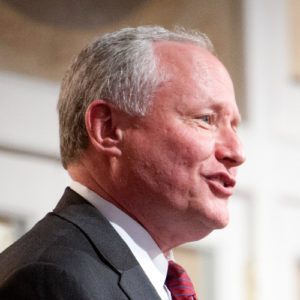Politics & Policy Writing as Literature
Study classics in political writing & learn how to do what the authors do.
July 1–5, 2024
Washington, DC
The third week of Political Studies is devoted to the theme of rhetoric.
In our first seminar, our study of oratory will be guided by Aristotle’s foundational Art of Rhetoric and his classification of the three kinds and modes of rhetoric. Fellows will analyze classic examples of rhetoric and contemporary political speeches, with a view toward understanding the relationship between political rhetoric and emotions, and how these connections can be both useful and dangerous, especially for democracies.
Our second seminar will delve into the American essence through reflection on Abraham Lincoln’s speeches and writings. Lincoln is often credited with having saved or re-founded the American Union by giving it a “new birth of freedom.” He is also often recognized as the creator of a new form of public speech. Through readings of his most celebrated speeches, students will seek to understand Lincoln’s statecraft in conjunction with his literary craft.
Image: Lithograph, 1905, Library of Congress
Diana Schaub on Lincon's Gettysburg Address
This course is part of our residential Political Studies Program. Fellows participate in morning seminars and meet prominent men and women in public life over afternoon and evening sessions. Up to 32 fellows will be selected.

Robert C. Bartlett is the Behrakis Professor of Hellenic Political Studies at Boston College. His principal area of research is classical political philosophy, with particular attention to the thinkers of ancient Hellas, including Thucydides, Plato, and Aristotle. He is the co-translator of a new edition of Aristotle’s Nicomachean Ethics.

Robert C. Bartlett is the Behrakis Professor of Hellenic Political Studies at Boston College. His principal area of research is classical political philosophy, with particular attention to the thinkers of ancient Hellas, including Thucydides, Plato, Xenophon, and Aristotle.
He is the author or editor of eight books, including Sophistry and Political Philosophy: Protagoras’ Challenge to Socrates, The Idea of Enlightenment, Plato’s Protagoras and Meno, and Xenophon’s The Shorter Socratic Writings. He is also the co-translator of a new edition of Aristotle’s Nicomachean Ethics (University of Chicago Press, 2011). He has also published articles in the American Political Science Review, American Journal of Politics, Journal of Politics, Review of Politics, and other leading scholarly journals.
Before coming to Boston College, Robert Bartlett served as the Arthur M. Blank/National Endowment for the Humanities Distinguished Teaching Professor at Emory University. He is a graduate of the University of Toronto and holds an MA in Classics and a Ph.D. in Political Science from Boston College.

Diana Schaub is a nonresident senior fellow at the American Enterprise Institute (AEI), where her work is focused on American political thought and history, particularly Abraham Lincoln, Frederick Douglass, African American political thought, Montesquieu, and the relevance of core American ideals to contemporary challenges and debates. Concurrently, she is Professor Emerita of Political Science at Loyola University Maryland, where she taught for almost three decades.

Diana Schaub is a nonresident senior fellow at the American Enterprise Institute (AEI), where her work is focused on American political thought and history, particularly Abraham Lincoln, Frederick Douglass, African American political thought, Montesquieu, and the relevance of core American ideals to contemporary challenges and debates. Concurrently, she is Professor Emerita of Political Science at Loyola University Maryland, where she taught for almost three decades.
An expert in political philosophy, Dr. Schaub has lectured on a variety of topics and participated in conferences around the country. She has contributed chapters to multiple books on Shakespeare, liberal education, women, and religion, and she is the author of three books: His Greatest Speeches: How Lincoln Moved the Nation (St. Martin’s Press, 2021); What So Proudly We Hail: The American Soul in Story, Speech, and Song, coedited with Amy and Leon Kass (ISI Books, 2011); and Erotic Liberalism: Women and Revolution in Montesquieu’s “Persian Letters” (Rowman & Littlefield, 1995). Her monograph Emancipating the Mind: Lincoln, the Founders, and Scientific Progress (AEI, 2018) is based on her remarks at the 2018 Walter Berns Constitution Day Lecture.
Dr. Schaub has also been published in the popular press, including in the Baltimore Sun, the Claremont Review of Books, Commentary, and the Wall Street Journal.
Dr. Schaub has a PhD and an MA in political science from the University of Chicago. Her BA in political science is from Kenyon College.
READINGS:
Epideictic Rhetoric
Judicial Rhetoric
Deliberative Rhetoric
DISCUSSION QUESTIONS:
READINGS:
On Pathos
On Ethos
On Logos
DISCUSSION QUESTIONS:
READINGS:
Rhetoric & Style
Rhetoric in Times of Crisis & Doubt
DISCUSSION QUESTIONS:
READINGS:
DISCUSSION QUESTIONS:
READINGS:
RECOMMENDED READING:
Lincoln and the Constitution, What So Proudly We Hail
READINGS:
DISCUSSION QUESTIONS:
READINGS:
DISCUSSION QUESTIONS:
READINGS:
DISCUSSION QUESTIONS:
READINGS:
DISCUSSION QUESTIONS:
READINGS:
DISCUSSION QUESTIONS:

Boris Fishman
Boris Fishman is the author of the novels A Replacement Life and Don’t Let My Baby Do Rodeo, both New York Times Notable Books of the Year, and Savage Feast, a family memoir told through recipes.
Henry Olsen
Henry Olsen, a senior fellow at the Ethics and Public Policy Center, studies and provides commentary on American politics. Mr. Olsen is an opinion columnist for The Washington Post, where he writes daily pieces focusing on politics, populism, foreign affairs and American conservative thought.

Flagg Taylor
Flagg Taylor is the Executive Director of the Center for Civics, Culture, & Society, at Miami University. His research specialty is in the history of political thought and American government, especially the question of executive power. He is Chair of the Academic Council of the Victims of Communism Memorial Foundation.

Thomas Merrill
Thomas Merrill is an associate professor in the School of Public Affairs at American University. He is the author of Hume and the Politics of Enlightenment. He is also the co-editor of three edited volumes, including The Political Thought of the Civil War.

Robert C. Bartlett
Robert C. Bartlett is the Behrakis Professor of Hellenic Political Studies at Boston College. His principal area of research is classical political philosophy, with particular attention to the thinkers of ancient Hellas, including Thucydides, Plato, and Aristotle. He is the co-translator of a new edition of Aristotle’s Nicomachean Ethics.

William Kristol
William Kristol is editor at large of The Weekly Standard, which, together with Fred Barnes and John Podhoretz, he founded in 1995. Mr. Kristol has served as chief of staff to the Vice President of the United States and to the Secretary of Education. Before coming to Washington in 1985, Kristol taught politics at the University of Pennsylvania and Harvard’s Kennedy School of Government.
Adam J. White
Adam J. White is the Laurence H. Silberman Chair in Constitutional Governance and senior fellow at the American Enterprise Institute, where he focuses on the Supreme Court and the administrative state. Concurrently, he codirects the Antonin Scalia Law School’s C. Boyden Gray Center for the Study of the Administrative State.
Gary J. Schmitt
Gary J. Schmitt is a senior fellow in the Social, Cultural, and Constitutional Studies program at the American Enterprise Institute (AEI), where he studies issues related to the American presidency, the U.S. constitution and its principles, and American civic life.
Vincent Phillip Muñoz
Vincent Phillip Muñoz is the Tocqueville Professor of Political Science and Concurrent Professor of Law at the University of Notre Dame.